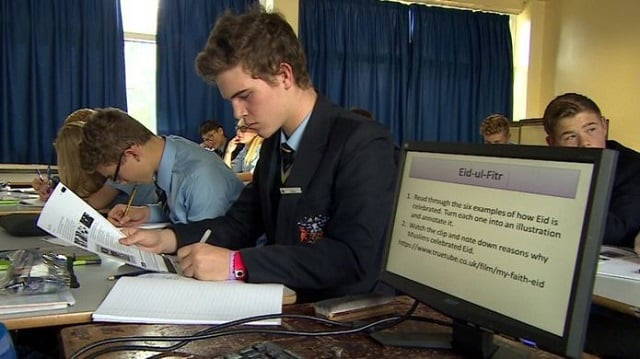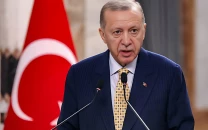'Schools in England break law by not teaching religious education'
Missing the subject leaves students 'unprepared for modern life'

RE can bring better understanding of other religions and cultures
PHOTO: BBC
According to a research conducted by the National Association of Teachers of Religious Education (NATRE) obtained by BBC local radio, the law says that religious education must be provided to students. It says that missing the subject leaves students “unprepared for modern life”.
Pak-Turk schools staff involved in terrorism, SHC told
The main union for secondary teachers said many schools cover religious issues but in other lessons. “They might be teaching through conferences, they might be using citizenship lessons, they might be using assemblies," said Geoff Barton, general secretary of the Association of School and College Leaders.
By law, religious education must be taught by all state-funded schools with detailed syllabuses agreed locally. NATRE said the Freedom of Information data, gathered by the department of education in 2015 has still not been published, and showed that overall, 26 per cent of secondary schools were not offering religious education Among academies, which make up the majority of secondary schools, more than a third (34 per cent) were not offering RE to 11 to 13-year-olds and almost half (44 per cent) were not offering it to 14 to 16-year-olds.
The association has warned the issue could escalate as more secondary schools become academies, which can choose to adopt a locally-agreed syllabus or develop their own. Fiona Moss of NATRE said too many schools were “breaking the law” and that pupils were “not religiously literate”.
“They don’t have the opportunity to learn about religions and beliefs, to learn what’s important to people or to have the chance to develop their own ideas, beliefs and values,” she told the BBC. The main union for secondary schools countered that religion was covered in other subjects, even if it was not a specific subject on the syllabus. Moss also said that there’s a shortage of specialist religious education teachers throughout the state system.
“They might be teaching through conferences, they might be using citizenship lessons, they might be using assemblies,” Geoff Barton, general secretary of the Association of School and College Leaders, told the BBC.
KGS overshadows other schools as CIE announces results
A spokesperson for the Department for Education told BBC: “The government firmly believes in the importance of religious education. Good quality RE can develop children’s knowledge of the values and traditions of Britain and other countries, and foster understanding among different faiths and cultures. Religious education remains compulsory for all state-funded schools, including academies and free schools, at all key stages and we expect all schools to fulfill their statutory duties.”
Ofsted investigators can also report a lack of RE in the syllabus if they believe its absence helps to explain why pupils are not doing as well as they should at the school.


1725099588-0/BeFunky-(41)1725099588-0-208x130.webp)
















COMMENTS
Comments are moderated and generally will be posted if they are on-topic and not abusive.
For more information, please see our Comments FAQ